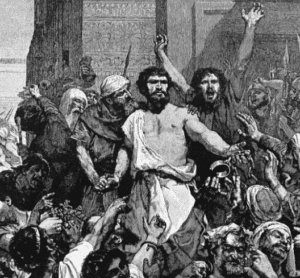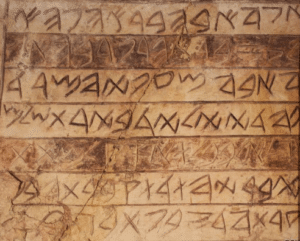During Jesus’ trial before Pilate leading up to His crucifixion, the gospels famously report that the crowd had an opportunity to free Jesus but instead demanded the release of a man named Barabbas, who was “a robber” (John 18:40) and a “notorious prisoner” (Matthew 27:16) who “committed murder in the insurrection,” (Mark 15:7). Critics of the New Testament challenge several parts of this story, not the least of which is the existence of a man named Barabbas in the first place! They argue that the name is a convenient play on the word “abba” (or “father”) and the account is not to be taken literally. Is there any reason to think that there ever was such a man?
What’s in a name?
The name “Barabbas” has drawn a lot of attention from critics. The prefix “bar” means “son of,” and typically identifies the literal name of the person’s father, as when we read, “a blind beggar named Bartimaeus, the son of Timaeus, was sitting by the road,” (Mark 10:46). Sometimes, however, it was used in a nickname, as in Barnabas, about whom we read:
“Now Joseph, a Levite of Cyprian birth, who was also called Barnabas by the apostles (which translated means Son of Encouragement)” (Acts 4:36).
In any case, the “bar” in “Barabbas” denotes “son of” Abbas. This is where the critical claims come in. Abbas, or abba, simply means “father.” Thus, Barabbas’ name literally means “son of father” or “son of the father”. Jesus Himself is frequently referred to as “the Son,” often speaking of God as “the Father.” Therefore, so the argument goes, having Jesus juxtaposed with a criminal conveniently named “Son of the Father” is obviously a literary device and a clever piece of allegorical symbolism. We ought not (so they say) take it for actual history.
 Skeptics have suggested a variety of meanings for what this alleged fable of Jesus and Barabbas would have meant. Indeed, in one alternative version, the name is not actually Bar Abbas (son of the father) but rather Bar Rabbas (son of the rabbi/teacher), and the story is an anti-Jewish, anti-Pharisee, or anti-Rabbinic tale. This would seem strange since the gospels most often use the term “Rabbi” as a positive title for Jesus Himself (e.g., Mark 9:5, John 4:31, etc.) or for other positive figures like John the Baptist (John 3:26), so the authors of the gospels do not seem to have any special association of the term “rabbi” with non-Christian Judaism. At any rate, the general consensus in each version of this argument is that the name “Barabbas” is too unusual and convenient to be that of a real person. What ever it means, it must mean something symbolic because there’s no way there could have been someone with that actual name imprisoned next to Jesus.
Skeptics have suggested a variety of meanings for what this alleged fable of Jesus and Barabbas would have meant. Indeed, in one alternative version, the name is not actually Bar Abbas (son of the father) but rather Bar Rabbas (son of the rabbi/teacher), and the story is an anti-Jewish, anti-Pharisee, or anti-Rabbinic tale. This would seem strange since the gospels most often use the term “Rabbi” as a positive title for Jesus Himself (e.g., Mark 9:5, John 4:31, etc.) or for other positive figures like John the Baptist (John 3:26), so the authors of the gospels do not seem to have any special association of the term “rabbi” with non-Christian Judaism. At any rate, the general consensus in each version of this argument is that the name “Barabbas” is too unusual and convenient to be that of a real person. What ever it means, it must mean something symbolic because there’s no way there could have been someone with that actual name imprisoned next to Jesus.
Now, this argument is weak even without any additional information. Even if “Barabbas” were a symbolic nickname of sorts, that wouldn’t actually prove that the man didn’t exist. As noted above, “Barnabas” was a symbolic nickname that the Apostles gave to Joseph of Cyprus. Likewise, “Peter” was a symbolic nickname that Jesus gave to Simon Barjona (Matthew 16:17-18). That these names had deep meaning immediately and for future readers doesn’t alter the fact that the people were real.
Nevertheless, there is actually solid evidence that “Barabbas” wasn’t symbolic at all and that he really was just the son of a man named Abbas.
The name of Barabbas in archaeology and history
It certainly seems strange to us that someone would actually be named “father.” A father naming his own son “father” is just confusing, at least to our sensibilities. Yet, it turns out, Abba was a real name among Jews in the ancient world. Archaeologists, for example, unearthed a tomb outside Jerusalem from not long before the time of Jesus which bares the inscription:
“I, Abba, son of the priest Eleazer, son of Aaron the high priest; I, Abba, an oppressed and persecuted man, native of Jerusalem, went to Babylonia and brought back (the bones of) Mattathi, son of Judah, and buried him in the cave which I acquired by writ.”1
 There is no reason to think that this Abba is directly related to the biblical Barabbas (though it is not hard to imagine the son or grandson of the man described in this inscription growing up to join a revolt against Rome), but what this does show is that “Abba” (which, as a name, would come into Greek as “Abbas”) not only was a real name at that time but was so specifically in Jerusalem. And if there was an Abbas, his son would be called Barabbas. What’s more, later Jewish sources preserved for us in the Talmud indicate that the name Abbas not only existed but was actually quite common! In one humorous but informative passage, we find a legend of a man named Shmuel who seeks to clear his name by visiting the dead to obtain information from his deceased father:
There is no reason to think that this Abba is directly related to the biblical Barabbas (though it is not hard to imagine the son or grandson of the man described in this inscription growing up to join a revolt against Rome), but what this does show is that “Abba” (which, as a name, would come into Greek as “Abbas”) not only was a real name at that time but was so specifically in Jerusalem. And if there was an Abbas, his son would be called Barabbas. What’s more, later Jewish sources preserved for us in the Talmud indicate that the name Abbas not only existed but was actually quite common! In one humorous but informative passage, we find a legend of a man named Shmuel who seeks to clear his name by visiting the dead to obtain information from his deceased father:
“Shmuel went after his father to the cemetery and said to the dead: I want Abba. The dead said to him: There are many Abbas here. He told them: I want Abba bar Abba. They said to him: There are also many people named Abba bar Abba here. He told them: I want Abba bar Abba, the father of Shmuel. Where is he?”2
While obviously a fable and written down well after the New Testament period, this Rabbinic story only works if the names Abba and Barabba were not only popular among the Jews at the time of the writing but also prior to that time so that they would be common names among the dead. At any rate, this and many other passages confirm widespread Jewish use of the names Abba and Barabba (or Abbas and Barabbas in Greek). Thus, the name being quite common, there is no reason to read any allegorical meaning into the episode nor take Barabbas as anything other than a historical figure.
References
| 1↑ | See marginal note 357[b] in Gaalya Cornfield, Josephus, The Jewish War: Newly Translated with Extensive Commentary and Archaeological Background Illustrations (Zondervan Publishing House, 1982) 64 |
|---|---|
| 2↑ | Babylonian Talmud, Berkhot 18b https://www.sefaria.org/Berakhot.18b.1?ven=William_Davidson_Edition_-_English&vhe=William_Davidson_Edition_-_Vocalized_Aramaic&lang=bi (Accessed 04/22/2022) |





